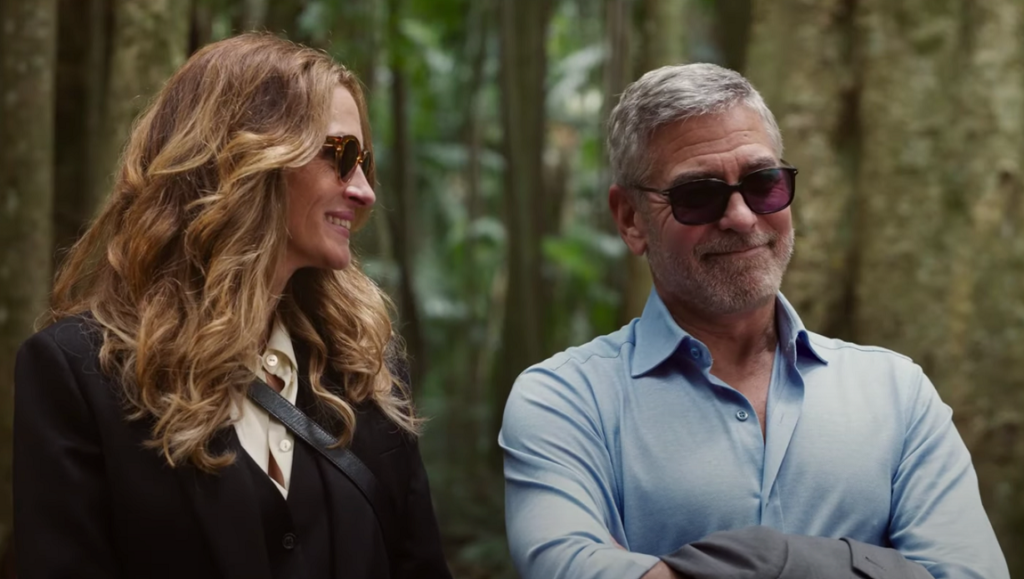Ticket to Paradise is an entirely charmless rom-com fronted by a poisonous couple and sleepwalking its way through bland genre tropes.
How hard could it possibly be to make an amusing enough romantic comedy fueled by two gigantic movie stars with historical chemistry? Ask Ol Parker, the writer and director of Ticket to Paradise, because either it’s a nearly impossible feat or he just didn’t try very hard. Even given that this is the domain of the rom-com, with attendant relaxed expectations, schmaltzy predicaments, and preordained narrative outcomes, there’s scarcely a funny moment or interesting wrinkle here.
Lily (Kaitlyn Dever) has just graduated from law school after four years of stress and toil, so she and longtime roommate Wren (Billie Lourd) decide to head to Bali for a lengthy vacation. There Lily meets Gede (Maxime Bouttier), a local seaweed farmer, and falls instantly and madly in love, despite knowing absolutely nothing about him. Fast forward a month or so. David Cotton (George Clooney), Lily’s father, is a very wealthy architect, and his ex-wife Georgia (Julia Roberts) is a prestigious art curator with a massive Los Angeles gallery named for her. They’re none too pleased to find out that Lily and Gede are getting hitched, and despite a couple of decades of divorce-fallout mutual acrimony, they choose to band together to disrupt their daughter’s nuptials and set her back on the right path.
Initial, meager credit where it’s due: at least David and Georgia are presented as self-absorbed, privileged, and toxic right off the bat, so despite their professions of love for their progeny, the attempt to, as David puts it, “Trojan Horse” the wedding doesn’t seem like a completely inexplicable choice for them, despite the fact that neither one of them for even a second considers just having a quick chat with Lily to ask some basic questions. Once they arrive on site in Bali, though, the already barely-there narrative dissolves into disjointed mugging and shtick, like an endless sequence of beer pong that amounts to nothing, or a rancid moment wherein Gede’s mother says a lot of things to them in Indonesian which is then translated as “Welcome!” Lovely.
Clooney and Roberts can do this kind of stuff in their sleep, and they very evidently are doing exactly that. Beyond their financial status and general assholishness, we learn materially nothing about them.Their cruelty toward their daughter and indifference toward literally everything else is meant to be a refreshing twist, but anyone who’s grown up with a narcissistic parent is more likely only to get their PTSD triggered. It’s impossible to be invested in this couple’s potential reconciliation, mostly because they’re so poisonous that they deserve each other. Not for nothing is there an extended subplot featuring Georgia’s new, much younger boyfriend, French airline pilot Paul (Lucas Bravo). He absolutely worships her, and she of course finds that vaguely annoying.
And what of Lily? Why does she abandon all the hard work that she poured into a law degree? Is it actually romantic that she says that she’s found “everything she’s always wanted” in Bali or is that merely what happens because the script demands it? Since we know nothing else about her — what she likes, why she wanted to study law, what attracts her to Gede — she winds up a background character in her own story, quite literally the MacGuffin.
Writer/director Parker does nothing to enliven the bland tedium either. Everything’s shot like an episode of The Bachelor (an insidious pop cultural artifact that no doubt was a tremendous influence on the gender and relationship dynamics on display here, not to mention the stupid Instagram travel porn). This was allegedly filmed in Australia, but vast swaths of it appear to be shot instead against greenscreen. Even the customary outtakes of the two leads clowning around on set seem not just perfunctory, but charmless andvaguely egotistical. Ticket to Paradise has actors saying lines on locations and sets and enacting characters in a scenario, so one supposes it meets the technical criteria to be called a movie, but that is the absolute best thing that could be said about it.


Comments are closed.